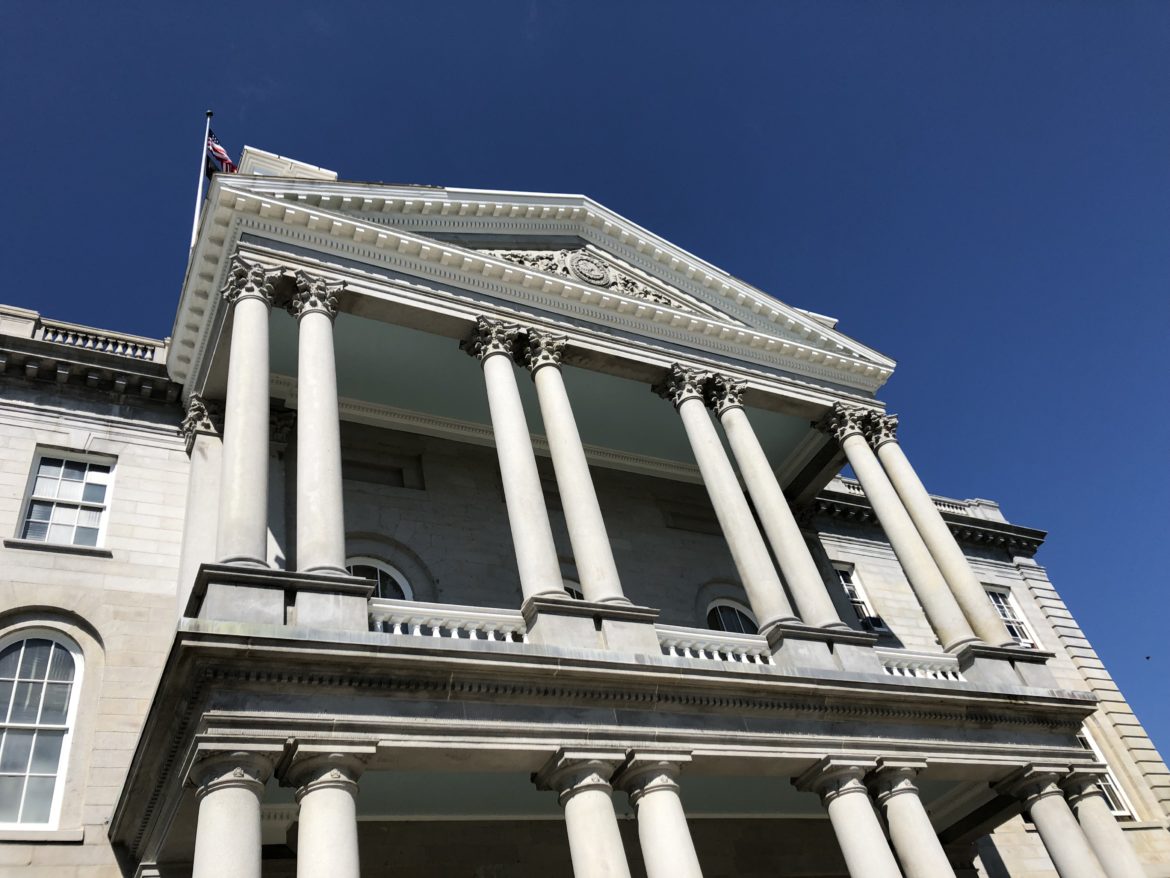Story Produced by NH Business Review, a Member of

Bills that would set up a paid family and medical leave program, raise the minimum wage, boost clean energy initiatives and provide tenant protections are all on the chopping block following vetoes by Gov. Chris Sununu. And, although the bills’ backers will try to rescue at least some of them when the New Hampshire Legislature meets Wednesday to try to override those vetoes, they are not likely to succeed.
During the last legislative session, Gov. Chris Sununu vetoed 22 bills, 13 of which affect New Hampshire businesses. But the total number of provisions is actually a lot higher, since one of the bills that was vetoed, House Bill 1234, is an omnibus bill of 40 measures rolled into one.
There will be substantive debates over such proposals as establishing a paid family and medical leave program funded via a payroll deduction, increasing net metering limits fivefold and raising the minimum wage by 65%.
Also passed, and then vetoed, were Covid-related bills that would extend emergency unemployment eligibility and one that would prevent evictions (though the latter has been eclipsed by an even more stringent emergency order from the Trump administration.)
The Senate and House each need to muster two-thirds votes to override the governor’s veto. Often, a close vote will be affected by turnout, which is especially uncertain during the pandemic. To socially distance, House members will be meeting at the Whittemore Center Arena at the University of New Hampshire and senators will be meeting in the House chambers in Concord.

A review of vetoed bills
Among the vetoed bills up for override votes on Wednesday are:
Senate Bill 59: Increases maximum limits for a net metering project from 1 to 5 megawatts. (The veto has already been overridden by the Senate).
SB 122: Ends the Regional Greenhouse Gas Initiative rebate for residential customers and rebates the entire amount to commercial and industrial customers, increasing the amount set aside to low income, municipality, and school district efficiency program. It was approved on a 14-10 vote in the Senate and on a 212-140 vote in the House.
SB 124: Continues the expansion of renewable portfolio standards, currently 25% renewable by 2025 to 56% by 2040. It was approved on a 14-10 Senate vote and a 214-141 House vote.
HB 466: HB 466: Increases the upper limit on a small generator from 100 to 125 kilowatts, allowing more small businesses to get a better reimbursement rate than residential solar. Passed on a voice vote in the Senate and a 201-120 vote in the House.
HB 1375: Directs manufacturers to pay the cost of medical monitoring of those exposed to toxic chemicals, including, but not limited tom PFAS. Passed on a 14-10 Senate vote and a 227-105 House vote.
HB 712: Imposes a 0.5 percent payroll deduction on all private employees in order to provide workers with 60 percent of their wages if they take up to 12 weeks off in order to care for themselves or a family member. Passed on a 14-10 Senate vote and a 215-141 vote in the House.
HB 731: Increases the minimum wage to $10 per hour in 2021 and $12 per hour in 2023, and sets the tipped minimum at $4 an hour (rather than a percentage of regular minimum). Passed on a 14-10 Senate vote and 119-124 in the House.
HB 1166: Extends coved-related eligibility expansions for unemployment; extends the federal unpaid family and medical leave act to business with more than 15 employees (as opposed to 50); waives cost-sharing for Covid-19 testing; requires employers provide sanitary conditions relating to Covid-19 and requires the state provide employers with 15 or fewer employees free personal protective equipment. Passed 14-10 in the Senate and 178-154 in the House.
HB 250: Institutes dental coverage under Medicaid managed care. Passed 19-5 in the Senate and 205-124 in the House.
HB 1246: Transfers $25 million of federal CARES Act money into a Covid-19 long-term care fund; sets up an independent Covid-19 long-term care review; authorizes pharmacists to administer a Covid-19 vaccine and tries to set up federal reimbursement of costs of training nursing assistants. Passed 14-10 in the Senate, 194-132 in the House.
HB 1247: Requires landlords to offer a six-month payment plan before eviction proceedings, gives rooming house residents tenant protections. Passed 14-10 in the Senate, 187-135 in the House.
HB 1454: Requires the state Board of Education to set up a process approving vendors offering alternative, extended learning and work-based programs that may be accepted for credit by a local school board. Passed 15-9 in the Senate and 193-136 in the House.
HB 1234: An omnibus bill that included SB 635, HB 1518, SB 498, HB 274, HB 1702, HB 1704, SB 591, SB 626, which would establish the Lakes Region Development Authority, similar to Pease Development Authority, to redevelop the former Laconia state school; require the Public Utilities Commission to promulgate rules on energy storage; increase the alternative compliance payment at a maximum of $55 per megawatt hour for utilities that fail to meet renewable portfolio requirements; require online car rental companies to collect and pay the rooms and meals tax; establish a solid waste working group; require the Department of Environmental Services to make rules about composting meat and animal products; shift the hard-to-measure current solid waste goal of 40% recycling and reduction to the more quantifiable goal of 25% disposal reduction; remove the fee to file certain administrative petitions with the site evaluation committee. The bill passed on a voice vote in the Senate and a 198-129 vote in the House.
 These articles are being shared by partners in The Granite State News Collaborative. For more information visit collaborativenh.org.
These articles are being shared by partners in The Granite State News Collaborative. For more information visit collaborativenh.org.







